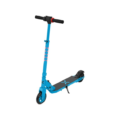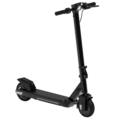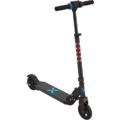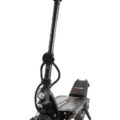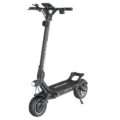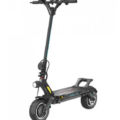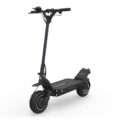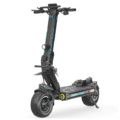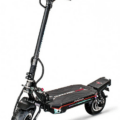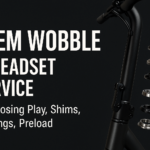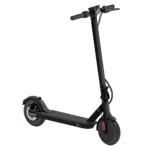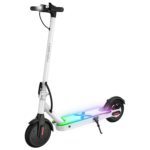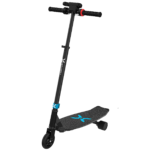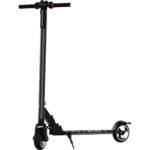- Home
- Scooters
- Electric Scooters
- Hover-1 Ace R350
Hover-1 Ace R350
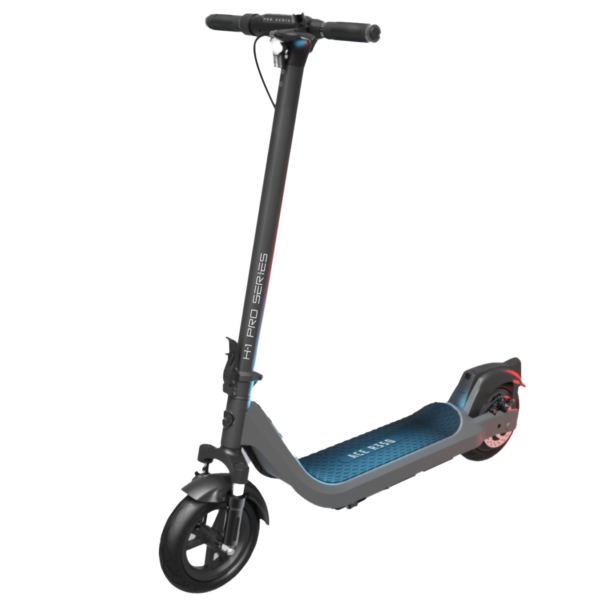

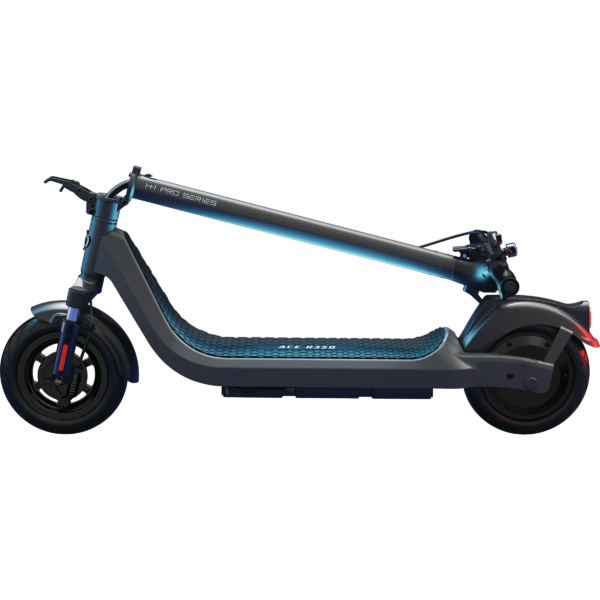
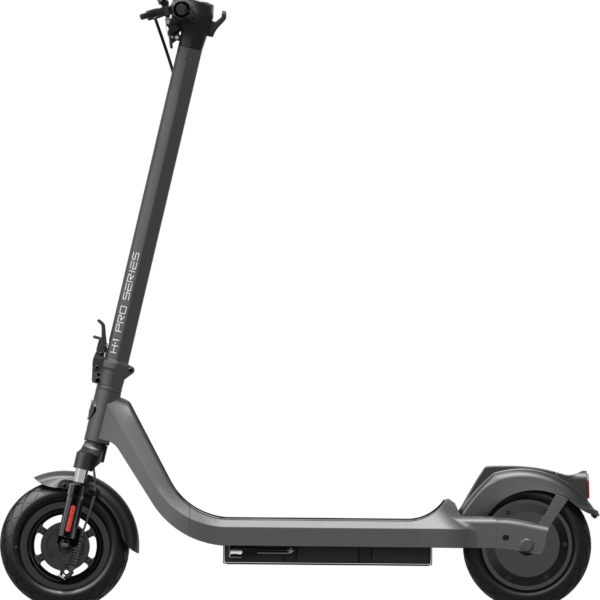
- Battery Range: 20 miles (32 km)
- Top Speed: 16 mph (26 km/h)
- Motor Power: 350 W (rated)
- Weight Capacity: 264 lb (120 kg)
- Charging Time: 6.5 hours
- Scooter Weight: 39.7 lb (18.0 kg)
PROS
- 10″ self-sealing tubeless tires
- Front suspension (dual shocks)
- App lock with 4 riding modes
- Compact folded size
- Drum + electronic braking
CONS
- IP rating not specified
- No rear suspension
- Modest hill climb (5°)
- Range depends on conditions

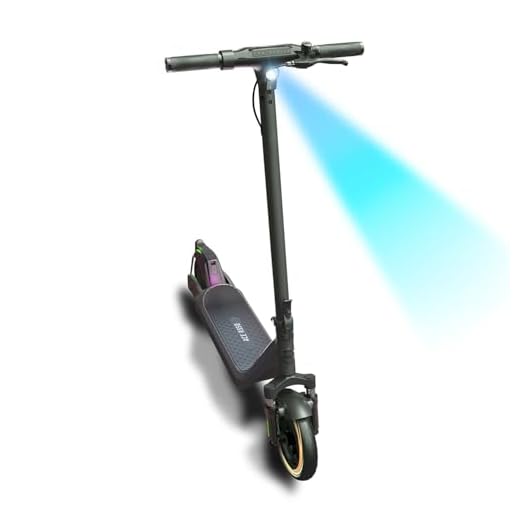
Table of contents
- What Is the Hover-1 Ace R350?
- How the Hover-1 Ace R350 Works
- Key Specifications (clean table)
- Design & Build Quality
- Performance Fundamentals
- Battery, Range & Efficiency
- Ride Quality & Comfort
- Braking & Safety Features
- Portability & Daily Usability
- Maintenance & Care
- Weather & Seasonal Considerations
- Hover-1 Ace R350 vs Alternatives
- Who the Hover-1 Ace R350 Is (and Isn’t) For
- FAQs
- Glossary
- Final Thoughts
The Hover-1 Ace R350 is a compact, app-enabled commuter scooter with a 350-watt rear hub motor, 10-inch self-sealing tubeless tires, and dual front shocks. It’s designed for first-time riders, students, and anyone who wants dependable last-mile transport without a steep learning curve. Because it balances comfort, control, and straightforward maintenance, the Hover-1 Ace R350 fits short urban commutes, campus hops, and errands where portability matters as much as ride quality. For full model details and official specs, see the Hover-1 Ace R350 product page.
What Is the Hover-1 Ace R350?
The Hover-1 Ace R350 is a folding electric scooter in the H-1 Pro Series line. It uses a 36-volt lithium-ion battery pack and a 350 W brushless rear hub motor to deliver an approachable top speed (up to 16 mph / 26 km/h) and a manufacturer-stated range suitable for daily use. With 10-inch self-sealing tubeless tires and dual front shocks, the scooter aims for comfort on imperfect city pavement while keeping flat-tire anxiety low.
Importantly, the Ace R350 keeps controls simple. A single brake lever actuates a front drum brake while the rear wheel adds electronic regenerative braking. Meanwhile, the thumb throttle, bright LED display, and app-selectable speed modes make it easy to dial in power delivery. Because the chassis uses a high-strength aluminum alloy, the deck and stem feel solid yet remain light enough for stairs and transit.
How the Hover-1 Ace R350 Works
At a glance, every modern electric scooter has the same basic recipe: a battery feeds a controller, the controller drives a motor, and your hands manage the ride with the throttle and brakes. The Ace R350 follows that simple pattern—deliberately—so beginners can focus on traffic and surface changes rather than settings.
- Motor. A 350 W brushless rear hub motor provides smooth, low-vibration drive. Because the motor is in the wheel, there’s no chain or belt to adjust. Peak output up to ~450 W gives a little extra punch for takeoffs and small hills.
- Controller. Think of the controller as the scooter’s “brain.” It interprets throttle position, manages current from the battery, and blends electronic braking with mechanical braking. Consequently, acceleration feels predictable rather than jerky.
- Battery. A 36 V lithium-ion pack rated around 7.8 Ah (≈285 Wh) sits under the deck. The pack is sized for practical trips without making the scooter heavy to carry. Charging uses the included wall charger and typically takes up to about 6.5 hours from low.
- Throttle. A thumb throttle lets you add speed with fine control. Because the Ace R350 supports kick-to-start, the motor only engages once the scooter is already rolling—this helps prevent accidental launches and improves battery efficiency.
- Brakes. A front drum brake gives consistent, weather-resistant stopping with low maintenance. At the rear, electronic braking (regen) helps scrub speed and recover a small amount of energy. As a result, braking feels progressive when you squeeze the lever.
Key Specifications (clean table)
The table below groups core details so you can scan the essentials fast. Values are shown in US units with metric in parentheses.
General
| Item | Value |
|---|---|
| Model | H1-ACE3 |
| Intended Use | Urban / campus / last-mile |
| Rider Weight | 40–264 lb (18–120 kg) |
| Top Speed | Up to 16 mph (26 km/h) |
| Stated Range | Up to 18.5–20 mi (30–32 km), rider and terrain dependent |
| Max Incline (manufacturer) | 15° (approx. 27% grade) |
Performance & Power
| Item | Value |
|---|---|
| Motor | 350 W brushless rear hub (peak ≈ 450 W) |
| Drive Modes | Walk, Eco, Drive, Sport |
| Kick-to-Start | Yes |
Battery, Charging & Electrical
| Item | Value |
|---|---|
| Battery | 36–36.5 V lithium-ion, ~7.8 Ah (≈285 Wh) |
| Charger | Model CP4215, 100–240 V AC |
| Charge Time | Up to ~6.5 hours from low |
| Display | LED screen with speed, mode, lock, cruise, and status icons |
| App Connectivity | H-1 Pro Series app (Bluetooth) |
Build & Dimensions
| Item | Value |
|---|---|
| Frame | High-strength aluminum alloy |
| Tires | 10 in self-sealing tubeless (front & rear) |
| Suspension | Dual front shocks |
| Brakes | Front drum + rear electronic (regen) |
| Weight | 39.68 lb (18 kg) |
| Unfolded Size | 47.24 × 20.27 × 47.24 in (120 × 51.5 × 120 cm) |
| Folded Size | 47.24 × 20.27 × 21.30 in (120 × 51.5 × 54.1 cm) |
Safety & Control
| Item | Value |
|---|---|
| Lights | Integrated headlight and taillight |
| Reflectivity | Frame/taillight visibility; use rider reflectors for night riding |
| Speed Modes | Walk / Eco / Drive / Sport |
| Lock Indicator | On-screen lock icon; app-based security features |
Features & Extras
| Item | Value |
|---|---|
| Cruise Control | Yes (hold steady speed ~6 seconds to engage; brake or throttle to cancel) |
| Kickstand | Yes |
| Bell | Integrated with brake lever |
| App Functions | Mode selection, status, and device settings |
Warranty & Compliance
| Item | Value |
|---|---|
| Warranty | 1-year limited (parts & labor; exclusions apply) |
| FCC ID | 2AANZACE |
| Operating Temp | 32–104 °F (0–40 °C) |
| Water Exposure | Avoid immersion and heavy rain; follow manufacturer guidance |
Design & Build Quality
The Hover-1 Ace R350 keeps the silhouette clean: a single sweeping deck transitions into the steering column with minimal gaps. Because the frame uses aluminum alloy, it resists corrosion and feels rigid without adding unnecessary weight. The folding hinge locks decisively with a short throw, and the hook-and-catch system holds the stem to the rear fender tab during carrying. In practice, that makes stairwells and bus steps easier.
Up top, the cockpit is tidy. The left side groups the brake lever and a mechanical bell. The right side houses the thumb throttle. Front and center, an LED display shows speed, mode, battery, cruise control, and even a lock icon. Therefore, you can confirm settings at a glance before rolling off. Additionally, the deck has enough usable length for an offset stance; most riders will fit one foot forward and one across without heels hanging off. Because the battery sits under the deck, the center of gravity stays low, which helps stability.
Fit-and-finish is above entry level. Panel seams are even, the cable routing is protected, and the drum brake is enclosed to keep grit out. The self-sealing tubeless tires and dual front shocks are the obvious highlights. As a result, the R350 rides more “grown-up” than many scooters in its power class, especially on broken urban asphalt.
Performance Fundamentals
While peak power matters, how a scooter delivers that power matters more. The Hover-1 Ace R350 trades headline acceleration for smoothness. From a standstill, kick-to-start engages the motor cleanly; there’s no abrupt jerk when you touch the throttle. In Eco mode, roll-on is gentle and ideal for dense paths. Drive mode quickens response enough for neighborhood streets. Sport mode feels closest to the scooter’s rated output, yet it still avoids wheelspin on dusty concrete.
On flat bike-lane pavement, cruising at 12–15 mph (19–24 km/h) feels relaxed and quiet. The 10-inch tubeless tires add rolling comfort and damp small cracks that would rattle small-wheel scooters. Because the controller blends mechanical and electronic braking, slow-downs are predictable, and the rear regen adds a touch of drag that settles the chassis before you come to a full stop.
Hill starts tell an honest story. On 7–10% grades, the Ace R350 will slow, yet it continues to climb if you carry some speed into the incline. Because the motor sits in the rear wheel, traction stays consistent as your weight shifts back on slopes. On very short, steeper driveways, the scooter may require a short kick assist. That’s normal for a 350 W commuter and keeps motor temps in check.
Battery, Range & Efficiency
Real-world range depends on speed, rider weight, temperature, wind, and elevation gain. The Hover-1 Ace R350 pairs a ~285 Wh pack with a 350 W motor, which is a sensible match for city riding. At 10–13 mph (16–21 km/h) on flat terrain with a 165 lb (75 kg) rider, you can expect better efficiency than at full throttle. Because the tires are tubeless and self-sealing, they can be run at correct pressures without anxiety, reducing rolling losses.
Manufacturers state up to roughly 18.5–20 miles (30–32 km). In practice, riders who weigh more, accelerate harder, or climb hills will see less. Cold weather also affects the chemistry: around 40 °F (4 °C), available capacity drops, and voltage sag increases under load. Therefore, plan a modest reserve and avoid running the pack to empty.
Charging best practices
- Let the scooter rest for 10–20 minutes before charging after a hard ride.
- Charge to 100% for longer weekend trips; stop around 90–95% for daily short rides to reduce time at full voltage.
- Store at ~50–60% charge if you won’t ride for a few weeks.
- Keep charging and storage temps between 32–104 °F (0–40 °C).
- Check the charger cable and port for debris before each plug-in.
Because the Ace R350 uses a simple deck-mounted pack, access for service is straightforward if a technician ever needs to check a connector or replace a seal.
Ride Quality & Comfort
Comfort starts with the tires. Ten-inch self-sealing tubeless tires feel more forgiving than small solid tires, especially over cracks, seams, and manhole lids. They also resist pinch flats and can automatically seal small punctures from city debris. As a result, you get the ride quality of pneumatic tires with extra peace of mind.
The dual front shocks are tuned on the firm side but still take the sting out of sharp hits. They help keep the front tire tracking over broken pavement during corner entry. Meanwhile, the long deck and low battery placement provide a planted feel; the scooter doesn’t pogo when you shift weight fore-aft. You may notice a bit of stem flex if you hit a sudden square-edge pothole—common to most folding designs—but it remains controlled at the Ace’s speeds.
Ergonomics feel natural for riders between ~5’3″ and 6’1″ (160–185 cm). The thumb throttle angle reduces wrist fatigue, and the brake lever sits at a reachable height without needing to overextend fingers. Because the LED display is bright, it remains legible in mid-day sun, yet it doesn’t glare at night.
Braking & Safety Features
The Hover-1 Ace R350 uses a front drum brake plus rear electronic regen. Drum brakes shine for commuter duty: they’re sealed from road grime, maintain consistent feel in wet conditions, and require less frequent adjustment than open discs. The electronic rear brake adds drag when you squeeze the lever, which shortens stopping distance and helps keep the scooter composed. Consequently, you get a two-stage sensation—initial gentle regen, then firmer mechanical bite.
The lighting system includes a forward headlight and a rear tail/brake light for visibility. For night rides, add reflective elements on your backpack or helmet and reduce speed; the scooter is visible, but rider-level reflectivity improves side-on detection at intersections. Because many cities have variable road marking quality, aim the headlight slightly downward to avoid blinding oncoming cyclists while still illuminating pavement seams.
Regarding water, treat the Ace like a fair-weather commuter. There isn’t a published ingress-protection (IP) rating; the manufacturer advises avoiding heavy rain, standing water, and washing with streams or hoses. Therefore, wipe it down with a damp cloth and store it indoors to keep electrical connectors dry.
Portability & Daily Usability
At 39.68 lb (18 kg), the Ace R350 isn’t featherweight, yet it remains manageable for short carries. The folded size—roughly 47.2 × 20.3 × 21.3 in (120 × 51.5 × 54.1 cm)—slides behind a desk or into a hatchback without drama. The folding latch feels secure, and the hook-to-fender catch helps during one-handed transport.
Daily habits matter more than specs. Because the scooter supports Walk, Eco, Drive, and Sport modes, you can match power to conditions. Use Walk in crowded plazas, Eco on shared paths, and Sport only when you have room to stop safely. Additionally, cruise control engages after holding a steady speed for several seconds, which reduces finger fatigue on longer stretches. Brake or tap the throttle to cancel—simple.
Security is layered. The app shows a lock icon and supports device-level security features, yet you should still use a sturdy lock through the deck or a secure anchor when leaving the scooter outside. As always, avoid storing it in a hot car or in direct summer sun; battery longevity and plastics both benefit from moderate temperatures.
Maintenance & Care
Electric scooters are low-maintenance compared with bikes and cars, but “low” doesn’t mean “none.” The Ace R350 rewards simple, regular checks:
Before each ride (30–60 seconds)
- Inspect tires for cuts and confirm pressure by thumb feel; top up weekly with a gauge.
- Squeeze the brake lever; ensure firm bite and smooth travel.
- Check the folding latch for play; lock it fully.
- Verify lights and display.
- Confirm you’re in the intended speed mode.
Every 2–4 weeks
- Measure tire pressure with a gauge; set to the manufacturer’s recommended range for 10-inch tubeless tires (adjust for rider weight and comfort).
- Wipe dust from the deck and display; keep connectors dry.
- Check fasteners on the stem clamp, brake hardware, and fenders.
- Listen for new creaks under braking; adjust the drum brake if lever throw increases.
Every 2–3 months
- Inspect the front drum linkage and cable housing for wear.
- Verify the kickstand spring tension.
- Look for nicks in the outer tire tread and remove embedded debris.
- If you pause riding for a season, charge the battery to ~50–60% and store indoors.
Firmware & app
- Open the app monthly, check for updates, and re-pair Bluetooth if needed.
- Revisit cruise control and mode settings after updates.
Because the Ace R350 uses a drum brake and sealed electronics, there’s less to tune than on a mechanical-disc scooter. Nevertheless, those quick checks keep performance consistent and prevent small issues from becoming large ones.
Weather & Seasonal Considerations
Rain. Without a stated IP rating, it’s best to treat light drizzle as a warning and heavier rain as a stop sign. Water can seep into connectors and bearings, leading to intermittent faults or premature wear. If you’re caught out, reduce speed, avoid paint lines, and brake early—wet drums still work but require gentler inputs.
Heat. High ambient temperatures raise motor and controller temperatures. Because the Ace is tuned conservatively, it manages heat well at commuter speeds. Still, avoid leaving the scooter in a closed car in summer, and let the pack cool before charging after a spirited ride.
Cold. Below about 40 °F (4 °C), the battery’s effective capacity falls, and the tires stiffen. As a result, range drops and traction decreases. Lower your cruising speed, keep mode in Eco or Drive, and build in an extra buffer to avoid arriving with 0% indicated charge.
Storage. Indoor storage is always best. Wipe off road spray with a damp cloth, never pressure-wash, and keep the charger and port clean.
Hover-1 Ace R350 vs Alternatives
Within the entry-to-mid commuter class, scooters cluster around similar numbers. Yet they differ in character. The Hover-1 Ace R350 emphasizes comfort and control more than raw acceleration. Consequently, it makes sense for new riders and for commutes that mix sidewalks, bike lanes, and neighborhood streets.
- Against ultra-budget models. The Ace’s dual front shocks, 10-inch tubeless tires, and drum + regen braking deliver a calmer, more composed ride. Cheaper scoots often use solid tires and no suspension, which can rattle riders and reduce grip on broken surfaces.
- Against step-up commuters. Heavier, more powerful scooters climb faster and hold higher speeds on long grades. However, they weigh more, cost more, and can feel over-eager for beginners. The Ace R350 stays approachable and easier to carry.
- Against off-road or performance models. Those are overkill for city runs. The Ace trades peak power and range for a lighter footprint, quicker charging, and simpler upkeep. If you don’t need 25–30 mph (40–48 km/h) speeds, you won’t miss them.
In short, the Ace R350 excels when comfort, predictability, and everyday practicality matter more than top-end pace.
Who the Hover-1 Ace R350 Is (and Isn’t) For
Ideal for:
- First-time owners who want a gentle learning curve with useful safety nets (kick-to-start, cruise control, progressive brakes).
- Students and campus riders who need a fold-and-go scooter that lives indoors.
- Multi-modal commuters who combine scooter, bus, rideshare, and office elevators.
- Urban riders who value tire comfort and flat-tire resistance.
Not ideal for:
- Riders who demand fast hill climbing or 20+ mph (32+ km/h) cruise.
- Heavy rain riders who expect regular wet-weather use.
- Long-distance commuters who need 25–30 miles (40–48 km) between charges.
Because the Hover-1 Ace R350 targets real-world city speeds and surfaces, it’s an easy recommendation for everyday errands and short commutes.
FAQs
1) How fast does the Hover-1 Ace R350 go?
Up to about 16 mph (26 km/h) in Sport mode under favorable conditions. Actual speed depends on rider weight, terrain, and battery state.
2) What range should I expect day to day?
Manufacturer figures cite up to roughly 18.5–20 miles (30–32 km). In mixed city riding with stops and small hills, many riders will see less. Plan a buffer and avoid arriving at 0%.
3) Does the Hover-1 Ace R350 have cruise control?
Yes. Hold a steady speed for several seconds to engage. Tap the throttle or squeeze the brake to disengage. You can also toggle cruise control in settings.
4) What kind of tires does it use?
10-inch self-sealing tubeless tires front and rear. They ride like pneumatics and can seal small punctures, which reduces flat-tire worry.
5) What brakes are on the Hover-1 Ace R350?
A front drum brake provides consistent stopping, and the rear wheel adds electronic regenerative braking. Together they give progressive, confidence-building deceleration.
6) Is the Hover-1 Ace R350 water-resistant?
There isn’t a published IP rating. Treat it as a fair-weather scooter, avoid heavy rain and standing water, and wipe it down after damp rides.
7) Where can I find a quick “Hover-1 Ace R350 overview”?
You’re reading it. This overview covers design, performance, range, comfort, braking, maintenance, and who the scooter suits.
Glossary
- Ah (Amp-hours): A measure of battery capacity; higher Ah usually means more stored energy if voltage is constant.
- Wh (Watt-hours): Energy capacity (V × Ah). A good predictor of realistic range.
- Brushless Hub Motor: An electric motor inside the wheel; efficient and low maintenance.
- Controller: Electronics that regulate power delivery and braking behavior.
- Regen (Regenerative Braking): Motor-based braking that slows the wheel and recovers a small amount of energy.
- Drum Brake: A sealed, low-maintenance brake that performs consistently in grime and light wet conditions.
- Kick-to-Start: Safety feature requiring a small push before the motor engages.
- Cruise Control: Maintains a constant speed so your thumb can rest.
- Speed Modes: Preset power limits (Walk/Eco/Drive/Sport) to match conditions and rider skill.
- Stem Flex: Slight bending of the folding stem under bumps; normal within limits.
- Tubeless Tire: Tire without an inner tube; can self-seal small punctures with sealant.
- Max Incline: Theoretical climb ability; real-world results vary with weight and speed.
- IP Rating: Ingress-protection code for dust/water; not provided here.
- Nominal Voltage: The rated operating voltage of a battery system (e.g., 36 V).
- Peak Power: Short bursts of power above the motor’s rated wattage, useful for starts and bumps.
Final Thoughts
The Hover-1 Ace R350 aims squarely at everyday riders who want comfort, simplicity, and enough performance to keep trips short and stress-free. Because it blends 10-inch self-sealing tubeless tires, dual front shocks, and easy-to-read controls with conservative, predictable power, it’s a confidence-building first scooter that remains useful well beyond the beginner phase. If your routine involves short commutes, elevators, and unpredictable city pavement, the Ace R350’s balanced approach will make daily travel feel straightforward and calm.
Specifications
General
| Model The Model specifies the exact version or name of the scooter. It helps identify its unique design, features, and specifications within the manufacturer’s product line. Knowing the model makes it easier to compare options, find compatible accessories, or look up support information. | Ace R350 |
| Brand The Brand identifies the manufacturer or company that designs and produces the scooter. A trusted brand is a sign of quality, reliability, and good customer support. Well-known brands often have higher standards for safety, performance, and after-sales service, giving you more confidence in your purchase. | Hover-1 |
| Release Date The Release Date indicates when the scooter model was officially launched on the market. This helps you know how current the design, technology, and features are. A newer release date often means updated components, improved performance, and the latest safety or smart features. | 17 November 2025 |
| Recommended Age Recommended Age indicates the minimum age range that the scooter is designed for, based on safety, size, and ease of use. Following the recommended age helps ensure that riders can handle the scooter’s speed, weight, and controls comfortably and safely. Always check local laws and use protective gear, especially for younger riders. | 14+ |
Performance & Power
| Motor Power (Wattage) What it means: The motor power, measured in watts (W), shows how strong the scooter’s electric motor is. Why it matters: Higher wattage usually means better acceleration, more torque, and improved performance on hills or rough terrain. For example, a 250W motor is good for flat city roads and light riders, while a 500W or 1000W motor provides more power for faster speeds or climbing steep inclines. | 350 W (rated), 450 W (max); Single motor |
| Top Speed The Top Speed indicates the maximum speed that the scooter can reach under optimal conditions. It’s usually measured on level ground with a fully charged battery and an average rider weight. A higher top speed allows you to travel longer distances faster, but always ensure you ride within legal speed limits and your personal comfort zone for safety. | 16 mph (26 km/h) |
| Battery Capacity Battery Capacity refers to the total amount of energy the scooter’s battery can store, usually measured in ampere-hours (Ah) or watt-hours (Wh). A higher battery capacity means you can ride longer distances on a single charge, reducing the need for frequent recharging. Keep in mind that actual range can vary depending on rider weight, terrain, speed, and weather conditions. | 36.5 V 7.8 Ah (285 Wh) |
| Estimated Range per Charge The Estimated Range per Charge indicates the average distance the scooter can travel on a single full battery charge. This range is calculated under optimal conditions, such as flat terrain, moderate speed, and average rider weight. Real-world range may vary depending on riding style, terrain, weather, and load. A longer range means fewer recharges and greater freedom for longer trips. | Up to 20 miles (32 km) |
| Hill Climb Ability Hill Climb Ability describes the maximum incline or slope that the scooter can handle while maintaining stable performance. It’s typically expressed as a percentage or in degrees. A higher hill climb rating means the scooter can tackle steeper hills without losing too much speed or power. Actual climbing performance may vary based on rider weight, battery charge, and terrain conditions. | Up to 6% / 5° |
| Drive System The Drive System refers to how power from the motor is delivered to the wheels. Electric scooters typically use either a hub motor (directly integrated into the wheel) or a chain/belt drive system. A high-quality drive system ensures smooth acceleration, efficient power transfer, and low maintenance. The choice of drive system affects performance, noise level, and overall ride experience. | Not specified |
Charging & Electrical
| Charging Time Charging Time indicates how long it takes to fully recharge the scooter’s battery from empty to 100% using the standard charger provided. Faster charging means less downtime and more time on the road. Actual charging time may vary slightly depending on battery capacity, charger output, and environmental conditions. | Up to 6.5 hours |
| Battery Type Battery Type refers to the specific technology used in the scooter’s battery, which affects performance, lifespan, weight, and charging time. Most modern electric scooters use high-quality lithium-ion (Li-ion) batteries because they offer a good balance of energy density, durability, and low maintenance. A reliable battery type ensures consistent power delivery and longer riding ranges. | Lithium-ion |
| Removable Battery A Removable Battery means the battery pack can be easily detached from the scooter for convenient charging and replacement. This feature allows you to charge the battery separately, swap it with a spare for extended range, or securely store it indoors in extreme weather. Removable batteries add flexibility and make it easier to keep your scooter powered up wherever you are. | Non-removable internal battery |
| Regenerative Braking Regenerative Braking is an energy-saving feature that converts some of the energy normally lost during braking back into battery power. When you slow down or brake, the motor works in reverse to generate electricity, which helps extend the scooter’s range and improves overall efficiency. This system also reduces wear on traditional brake components, leading to lower maintenance over time. | Not specified |
| Lighting Lighting refers to the built-in front and rear lights that enhance visibility and safety when riding in low-light conditions or at night. Good lighting helps you see the road ahead and ensures that other road users can see you. Many scooters include LED headlights, taillights, and sometimes brake lights or side reflectors for added safety and compliance with local traffic regulations. | Front LED headlight, rear LED taillight |
Build & Dimensions
| Scooter Weight Scooter Weight refers to the total weight of the scooter when fully assembled, including the battery. This affects how easy it is to carry, lift, and store the scooter when not in use. A lighter scooter is more portable and convenient for commuting, especially if you need to carry it upstairs or onto public transport. Keep in mind that a sturdy frame and quality components may add to the weight but also contribute to better durability and ride stability. | 39.7 lb (18.0 kg) |
| Maximum Rider Weight Maximum Rider Weight indicates the highest rider weight that the scooter is designed to safely support while maintaining optimal performance and stability. Staying within this limit helps ensure reliable acceleration, braking, and climbing ability, and it protects the frame, suspension, and motor from excessive strain. Exceeding the recommended limit may reduce performance and increase wear on components. | 264 lb (120 kg) |
| Deck Size Deck Size refers to the dimensions of the scooter’s standing platform. A wider and longer deck provides more foot space, allowing you to stand comfortably and adjust your stance while riding. A well-sized deck improves balance and stability, especially on longer rides or at higher speeds. Compact decks, on the other hand, help keep the scooter lightweight and portable. | Straight T-bar cockpit; deck-mounted kickstand |
| Handlebar Height Handlebar Height refers to the distance from the deck to the handlebars, which affects your riding posture and comfort. An appropriate handlebar height helps you maintain good balance, reduces strain on your back and arms, and makes steering more comfortable. Some scooters have adjustable handlebars to fit riders of different heights, while others have a fixed height for a streamlined design. | Not specified |
| Folding Mechanism The Folding Mechanism describes how easily and securely the scooter can be folded for carrying and storage. A well-designed folding system lets you quickly collapse the scooter into a compact size, making it convenient to transport on public transit, store under a desk, or fit into a car trunk. Look for sturdy latches and safety locks to ensure the scooter stays firmly in place when folded or unfolded. | Central folding hinge with hook latch |
| Dimensions Folded Dimensions indicate the size of the scooter when it’s fully folded. This measurement shows how much space the scooter will take up when stored or carried, making it easier to check if it will fit in your car trunk, under a desk, or in a closet. Compact folded dimensions are ideal for commuters who need to bring their scooter on public transport or store it in tight spaces. | Folded: 47.24 × 20.27 × 21.30 in (120 × 51.48 × 54.1 cm); Unfolded: 47.24 × 20.27 × 47.24 in (120 × 51.48 × 120 cm) |
| Material Material refers to the primary construction materials used for the scooter’s frame and key components. High-quality materials like aircraft-grade aluminum, reinforced steel, or durable composites provide strength, stability, and a lighter overall weight. A sturdy material ensures the scooter can handle daily wear and tear while maintaining safety and performance. | Not specified |
Safety & Control
| Brake Type(s) Brake Type(s) describe the braking systems the scooter uses to help you slow down or stop safely. Common brake types include mechanical brakes (like drum or disc brakes), electronic brakes, and foot brakes. Many scooters combine multiple braking systems for added safety and shorter stopping distances. The type and quality of brakes affect your control, especially when riding at higher speeds or on slopes. | Front drum + electronic brake |
| Suspension Suspension refers to the system that absorbs shocks and vibrations while riding, providing a smoother and more comfortable ride over uneven or rough surfaces. Scooters may have front suspension, rear suspension, or dual suspension for better shock absorption and stability. Good suspension helps reduce rider fatigue and improves control, especially when riding on bumpy roads or off-road paths. | Front suspension (dual shocks) |
| Tire Type Tire Type refers to the kind of tires the scooter uses, which directly affects ride comfort, traction, and maintenance. Common types include solid (airless) tires, pneumatic (air-filled) tires, or hybrid options. Pneumatic tires offer better shock absorption and a smoother ride on rough surfaces, while solid tires are puncture-proof and require less upkeep. The right tire type helps ensure safe handling and a comfortable ride in different conditions. | 10″ self-sealing tubeless |
| Tire Size Tire Size indicates the diameter and width of the scooter’s tires, which affect ride comfort, stability, and how well the scooter handles different terrains. Larger tires generally offer better shock absorption and a smoother ride over bumps and rough surfaces, while smaller tires keep the scooter lighter and more portable. Choosing the right tire size helps ensure a balance between agility and comfort. | 10-inch |
| Kickstand The Kickstand is a built-in stand that allows you to park your scooter upright when it’s not in use. A sturdy kickstand keeps the scooter stable and prevents it from tipping over, protecting it from scratches and damage. It also makes storing and accessing your scooter more convenient, whether you’re at home, work, or on the go. | Side kickstand |
| Water Resistance Rating Water Resistance Rating indicates how well the scooter is protected against water and moisture, usually shown as an IP (Ingress Protection) rating. This rating helps you understand whether the scooter can handle light rain, splashes, or wet roads without damage. While most scooters are not fully waterproof, a good water resistance rating adds peace of mind when riding in changing weather conditions. Always avoid deep puddles or submerging the scooter to protect its electrical components. | Not specified |
Features & Extras
| Display/Console The Display (or Console) shows important real-time information about your ride, helping you monitor your scooter’s status at a glance. Typical displays show speed, battery level, distance traveled, and riding mode. Some models also include additional features like Bluetooth connectivity, app integration, or backlighting for better visibility at night. A clear and easy-to-read display enhances safety and convenience on every trip. | LED display with speed, battery, trip & error codes |
| Ride Modes Ride Modes refer to the different speed and power settings you can choose to match your riding style or road conditions. Common modes include eco for maximum range and energy efficiency, standard for everyday balance, and sport or turbo for higher speed and stronger acceleration. Switching between ride modes allows you to customize performance, conserve battery, and ride safely in various environments. | Walk / Eco / Drive / Sport (4 modes) |
| Smart App Connectivity Smart App Connectivity lets you pair your scooter with a dedicated mobile app via Bluetooth. Using the app, you can monitor real-time ride stats like speed, battery level, and range, adjust settings such as ride modes or cruise control, lock the scooter for added security, and sometimes receive firmware updates. This feature adds convenience and allows you to personalize your riding experience right from your smartphone. | H-1 Pro Series app (lock, modes, cruise control, updates) |
| Anti-Theft System The Anti-Theft System helps protect your scooter from unauthorized use or theft. This feature can include built-in alarms, electronic motor locks, GPS tracking, or remote locking through a mobile app. A good anti-theft system provides peace of mind when parking your scooter in public spaces, adding an extra layer of security to safeguard your investment. | App lock |
| Cruise Control Cruise Control allows you to maintain a steady speed without continuously holding the throttle. This feature makes longer rides more comfortable by reducing hand fatigue and providing a smoother, more relaxed riding experience — especially on flat, open roads or bike lanes. For safety, cruise control can usually be easily activated or deactivated while riding. | Yes |
| Accessories Included Accessories Included lists the additional items that come with the scooter to enhance your riding experience and convenience. Common accessories may include a charger, kickstand, bell, lights, phone holder, or carrying strap. These extras add value by making your scooter safer, easier to use, and ready to ride straight out of the box. | Scooter, charger, tools, manual |
Warranty & Compliance
| Warranty Period The Warranty Period indicates how long the manufacturer guarantees the scooter against defects in materials and workmanship under normal use. A good warranty provides peace of mind, showing the brand’s confidence in its product quality. Always check what parts are covered, such as the frame, battery, and motor, and follow the maintenance guidelines to keep your warranty valid. | Region-dependent |
| Certifications Certifications confirm that the scooter meets specific safety, quality, and environmental standards set by recognized organizations or regulatory bodies. Common certifications may include CE, RoHS, UL, or other local compliance marks, depending on your region. These certifications ensure that the scooter is manufactured to high standards and is safe and legal to use in your country. | FCC compliance |
Price Comparison




